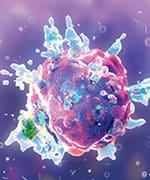Life Extension Magazine.
The spice turmeric has been used in Indian cooking and traditional medicine for thousands of years. 1
There is some evidence from epidemiological studies that populations that regularly consume turmeric have lower rates of Alzheimer’s as well as better-preserved cognition. 2
A large body of scientific evidence reveals that turmeric’s benefits are mainly attributable to the compound known as curcumin.
Research shows that curcumin helps prevent processes that drive aging and chronic disorders, including cell senescence and chronic inflammation. 3-5
The overall effect may be to improve healthy longevity.
The Power of Curcumin
Curcumin is a yellowish pigment found in turmeric, a plant in the ginger family.
In studies, curcumin intake has been shown to extend lifespan of diverse species, from roundworms to mice.6-11 In a study of fruit flies, for example, it increased the average lifespan by 26%.9
In addition, research suggests it can help in the management of many conditions including metabolic syndrome, elevated lipids, arthritis, and more.12
A number of studies have found that curcumin supplementation led to improvements in cognition and memory. 13
How does curcumin deliver its benefits? Science has identified several drivers of aging and chronic disease. Curcumin affects many of them3-5 in ways that improve health.
Protecting Telomeres
Every strand of DNA in our body has protective end caps, called telomeres, that help maintain the stability and function of the genetic material.
As we age, these telomeres shorten. When they are too short, the cell becomes dysfunctional or die. Shortened telomeres limit regeneration and stem cell function.
Telomerase is an enzyme that builds up the length of existing telomeres.
Curcumin has been shown in preclinical studies to give a boost to this anti-aging enzyme. It can enhance the expression and activity of telomerase, increasing the health and life of cells. 14,15
Support Brain Function
Research has identified specific brain benefits for curcumin.
In animal studies, curcumin has been shown to:16-18
- Form new neurons in the hippocampus,
- Improve performance on memory tests,
- Reduce neuroinflammation, and
- Protect against memory loss.
But the benefits of curcumin go beyond just neuroprotection.
Fighting Glycation
Glycation occurs when sugars attach to proteins, fats, or nucleic acids, causing deleterious structural and functional changes. It is a major contributor to accelerated aging and many diseases of older age.19,20
This process even occurs in people with normal blood glucose. In diabetics and prediabetics, glycation is accelerated, leading to faster aging and higher risk for chronic disorders.
Preclinical studies have shown that curcumin protects cells and tissues from the damage caused by glycation. 21-25
One team of researchers has shown that, in cell culture models, curcumin can also block harmful effects when glycation has already occurred, preventing the inflammation and cellular dysfunction caused by advanced glycation end products.25
Reducing Senescent Cells
As cells age, some become senescent. These cells are dysfunctional and emit protein degrading enzymes but refuse to die off to make room for healthy cells. Senescent cells also secrete inflammatory compounds that damage surrounding tissues.26
Curcumin has demonstrated senolytic activity in preclinical studies,27,28 which means it has the potential to reduce the number of senescent cells in tissues. In other similar models, it has also been shown to help favorably modulate the secretion of inflammatory compounds from these cells.4
Regulating Vital Proteins
Maladaptive activity of various essential structural and functional proteins in cells has been tied to accelerated aging, metabolic abnormalities, and chronic inflammation.3-5
Curcumin modulates their activity in ways that reverse age-related changes and protect cells against age-related damage. It can:3-5
- Inhibit nuclear factor-kappa B (NF-kB), a protein complex associated with chronic inflammation,
- Reduce activity of mTOR, a protein linked to rapid aging and metabolic abnormalities that contribute to chronic disease,
- Boost activity of AMPK, an enzyme that supports healthy metabolism,
- Enhance function of sirtuins, proteins critical for maintaining health and longevity, and
- Support activity of Nrf2, a protein that regulates the body’s defenses against oxidative stress.
Other Anti-Aging Mechanisms
There are many more anti-aging actions of curcumin. Among other benefits, curcumin:
- Acts as a potent free-radical scavenger, helping to prevent the oxidative stress that accompanies most age-related chronic disease,29
- Triggers production of the body’s own antioxidant enzymes, 3-5
- Reduces chronic inflammation,3 another driver of aging and age-related disease,
- Supports healthy mitochondrial function,30 and
- Activates autophagy, cellular “house-keeping,” to rejuvenate cells and keep them functioning optimally.31
These and other actions can help reduce risk for disease and prevent accelerated aging.
What you need to know
An Anti-Aging Nutrient
Scientists have identified processes that drive aging and risk for disease, including oxidative stress, chronic inflammation, glycation, cellular senescence, telomere loss, and more.
Curcumin, a polyphenol in turmeric, has been found to influence every one of these processes in ways that improve health and may slow aging.
In animal studies, curcumin intake is associated with longevity and reduced risk for chronic age-related disease.
Human studies show that curcumin use improves cognition and memory.
Summary
Curcumin is a potent anti-inflammatory compound.
Research over the last few decades reveals that curcumin favorably influences known contributors to aging and chronic disease.
In animal studies, curcumin extends lifespan while reducing risk for many age-related disorders.
If you have any questions on the scientific content of this article, please call a Life Extension Wellness Specialist at 1-866-864-3027.
Boosting Bioavailability
On its own, curcumin has low bioavailability. Much of the curcumin you consume is not absorbed into the bloodstream.
Scientists discovered that combining curcumin with galactomannans, from the spice fenugreek, boosts bioavailability by more than 45 times compared to unformulated curcumin.32
Combining curcumin with other nutrients, including turmerones from turmeric and gingerols from ginger root, may further increase its bioavailability and health benefits.
References
- Available at: https://www.ncbi.nlm.nih.gov/books/NBK92752/. Accessed September 23, 2022.
- Sikora E, Scapagnini G, Barbagallo M. Curcumin, inflammation, ageing and age-related diseases. Immun Ageing. 2010 Jan 17;7(1):1.
- Bahrami A, Montecucco F, Carbone F, et al. Effects of Curcumin on Aging: Molecular Mechanisms and Experimental Evidence. Biomed Res Int. 2021;2021:8972074.
- Benameur T, Soleti R, Panaro MA, et al. Curcumin as Prospective Anti-Aging Natural Compound: Focus on Brain. Molecules. 2021 Aug 7;26(16).
- Zia A, Farkhondeh T, Pourbagher-Shahri AM, et al. The role of curcumin in aging and senescence: Molecular mechanisms. Biomed Pharmacother. 2021 Feb;134:111119.
- Lee KS, Lee BS, Semnani S, et al. Curcumin extends life span, improves health span, and modulates the expression of age-associated aging genes in Drosophila melanogaster. Rejuvenation Res. 2010 Oct;13(5):561-70.
- Liao VH, Yu CW, Chu YJ, et al. Curcumin-mediated lifespan extension in Caenorhabditis elegans. Mech Ageing Dev. 2011 Oct;132(10):480-7.
- Shen LR, Parnell LD, Ordovas JM, et al. Curcumin and aging. Biofactors. 2013 Jan-Feb;39(1):133-40.
- Shen LR, Xiao F, Yuan P, et al. Curcumin-supplemented diets increase superoxide dismutase activity and mean lifespan in Drosophila. Age (Dordr). 2013 Aug;35(4):1133-42.
- Soh JW, Marowsky N, Nichols TJ, et al. Curcumin is an early-acting stage-specific inducer of extended functional longevity in Drosophila. Exp Gerontol. 2013 Feb;48(2):229-39.
- Stepien K, Wojdyla D, Nowak K, et al. Impact of curcumin on replicative and chronological aging in the Saccharomyces cerevisiae yeast. Biogerontology. 2020 Feb;21(1):109-23.
- Hewlings SJ, Kalman DS. Curcumin: A Review of Its Effects on Human Health. Foods. 2017 Oct 22;6(10).
- Seddon N, D’Cunha NM, Mellor DD, et al. Effects of Curcumin on Cognitive Function—A Systematic Review of Randomized Controlled Trials. Exploratory Research and Hypothesis in Medicine. 2019 03/19;4(1):1-11.
- Taka T, Changtam C, Thaichana P, et al. Curcuminoid derivatives enhance telomerase activity in an in vitro TRAP assay. Bioorg Med Chem Lett. 2014 Nov 15;24(22):5242-6.
- Xiao Z, Zhang A, Lin J, et al. Telomerase: a target for therapeutic effects of curcumin and a curcumin derivative in Abeta1-42 insult in vitro. PLoS One. 2014;9(7):e101251.
- Yu Y, Shen Q, Lai Y, et al. Anti-inflammatory Effects of Curcumin in Microglial Cells. Front Pharmacol. 2018;9:386.
- Sunny A, Ramalingam K, Das S, et al. Bioavailable curcumin alleviates lipopolysaccharide-induced neuroinflammation and improves cognition in experimental animals. Pharmacognosy Magazine. 2019 April 1, 2019;15(62):111-7.
- Dong S, Zeng Q, Mitchell ES, et al. Curcumin enhances neurogenesis and cognition in aged rats: implications for transcriptional interactions related to growth and synaptic plasticity. PLoS One. 2012;7(2):e31211.
- Kim CS, Park S, Kim J. The role of glycation in the pathogenesis of aging and its prevention through herbal products and physical exercise. J Exerc Nutrition Biochem. 2017 Sep 30;21(3):55-61.
- Simm A. Protein glycation during aging and in cardiovascular disease. J Proteomics. 2013 Oct 30;92:248-59.
- Hu TY, Liu CL, Chyau CC, et al. Trapping of methylglyoxal by curcumin in cell-free systems and in human umbilical vein endothelial cells. J Agric Food Chem. 2012 Aug 22;60(33):8190-6.
- Liu JP, Feng L, Zhu MM, et al. The in vitro protective effects of curcumin and demethoxycurcumin in Curcuma longa extract on advanced glycation end products-induced mesangial cell apoptosis and oxidative stress. Planta Med. 2012 Nov;78(16):1757-60.
- Sajithlal GB, Chithra P, Chandrakasan G. Effect of curcumin on the advanced glycation and cross-linking of collagen in diabetic rats. Biochem Pharmacol. 1998 Dec 15;56(12):1607-14.
- Lima TFO, Costa MC, Figueiredo ID, et al. Curcumin, Alone or in Combination with Aminoguanidine, Increases Antioxidant Defenses and Glycation Product Detoxification in Streptozotocin-Diabetic Rats: A Therapeutic Strategy to Mitigate Glycoxidative Stress. Oxid Med Cell Longev. 2020;2020:1036360.
- Tang Y, Chen A. Curcumin eliminates the effect of advanced glycation end-products (AGEs) on the divergent regulation of gene expression of receptors of AGEs by interrupting leptin signaling. Lab Invest. 2014 May;94(5):503-16.
- Ohtani N. The roles and mechanisms of senescence-associated secretory phenotype (SASP): can it be controlled by senolysis? Inflamm Regen. 2022 Apr 2;42(1):11.
- Cherif H, Bisson DG, Jarzem P, et al. Curcumin and o-Vanillin Exhibit Evidence of Senolytic Activity in Human IVD Cells In Vitro. J Clin Med. 2019 Mar 29;8(4).
- Yousefzadeh MJ, Zhu Y, McGowan SJ, et al. Fisetin is a senotherapeutic that extends health and lifespan. EBioMedicine. 2018 Oct;36:18-28.
- Jakubczyk K, Druzga A, Katarzyna J, et al. Antioxidant Potential of Curcumin-A Meta-Analysis of Randomized Clinical Trials. Antioxidants (Basel). 2020 Nov 6;9(11).
- de Oliveira MR, Jardim FR, Setzer WN, et al. Curcumin, mitochondrial biogenesis, and mitophagy: Exploring recent data and indicating future needs. Biotechnol Adv. 2016 Sep-Oct;34(5):813-26.
- Rainey NE, Moustapha A, Petit PX. Curcumin, a Multifaceted Hormetic Agent, Mediates an Intricate Crosstalk between Mitochondrial Turnover, Autophagy, and Apoptosis. Oxid Med Cell Longev. 2020;2020:3656419.
- Kumar D, Jacob D, Subash PS, et al. Enhanced bioavailability and relative distribution of free (unconjugated) curcuminoids following the oral administration of a food-grade formulation with fenugreek dietary fibre: A randomised double-blind crossover study. J Funct Foods. 2016;22:578-87.






